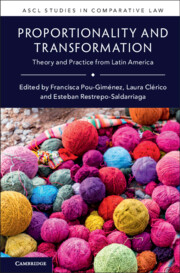Book contents
- Proportionality and Transformation
- Ascl Studies in Comparative Law
- Proportionality and Transformation
- Copyright page
- Contents
- Editors
- Contributors
- Acknowledgments
- Introduction
- Part I Proportionality and Processes of Constitutionalization
- Part II Proportionality in Social Rights and Equality-Based Adjudication
- 6 Socioeconomic Rights in the Colombian Constitutional Jurisprudence
- 7 Progressive Realization, Nonretrogression and Maximum of Available Resources
- 8 The Use of Proportionality by the Inter-American Court in Equality and Nondiscrimination Cases
- 9 Transformation and Its Limits
- Part III Proportionality, between Transformation and the Status Quo
- Index
7 - Progressive Realization, Nonretrogression and Maximum of Available Resources
Agreements and Disagreements between the Inter-American Court and the United Nations ESCR Committee
from Part II - Proportionality in Social Rights and Equality-Based Adjudication
Published online by Cambridge University Press: 27 October 2022
- Proportionality and Transformation
- Ascl Studies in Comparative Law
- Proportionality and Transformation
- Copyright page
- Contents
- Editors
- Contributors
- Acknowledgments
- Introduction
- Part I Proportionality and Processes of Constitutionalization
- Part II Proportionality in Social Rights and Equality-Based Adjudication
- 6 Socioeconomic Rights in the Colombian Constitutional Jurisprudence
- 7 Progressive Realization, Nonretrogression and Maximum of Available Resources
- 8 The Use of Proportionality by the Inter-American Court in Equality and Nondiscrimination Cases
- 9 Transformation and Its Limits
- Part III Proportionality, between Transformation and the Status Quo
- Index
Summary
The chapter draws a comparison between the recent doctrine of the Inter-American Court of Human Rights on the duty of progressive realization, nonretrogression and use of the maximum of available resources and that of the United Nations Committee of Economic, Social and Cultural Rights in the cases decided from 2013 through individual communications. The Optional Protocol introduces the standard of reasonableness in the examination of the measures adopted by states to comply with its obligations, but whenever the satisfaction of the right’s minimum core, or the position of vulnerable groups is at stake, the Committee applies a sort of “strict scrutiny.” In these cases, a presumption of invalidity applies, the burden of justification shifts, and the state must demonstrate the unavailability of less restrictive measures. Reasoning about necessity and alternatives is often relevant also for the Inter-American Court, but this court does not adopt a structured proportionality analysis and develops the relevant notions and state obligations along formally different lines. The chapter analyzes commonalities and differences between the two approaches, signaling lines of evolution that emerge when placed in dialogue with one another.
Keywords
- Type
- Chapter
- Information
- Proportionality and TransformationTheory and Practice from Latin America, pp. 161 - 184Publisher: Cambridge University PressPrint publication year: 2022

